- Home
- Natalia Ginzburg
A Place to Live Page 9
A Place to Live Read online
Page 9
But it was as if he had cast a pall over the whole city. He was there, hidden and virulent, lurking on some unknown street with his mustache and his gloves. Sometimes I would say to myself in his courteous, guttural voice, “Do you have a papa? Well, do you?”
Finally I stopped being afraid of him. But he became a symbol of all that was unknown and that filled me with dread. He was everything: he was mathematics, which I didn’t understand and which my mother, forever inept, kept calling “arithmetic”; he was the least common denominator and the greatest common multiple; he was my life outside the house, in the fog, far from my mother; he was my isolation, my failure to make friends, my struggles over homework, my sorrow at growing up, the melancholy that assailed me when the city grew dark, when I gazed out the window at the disconsolate nocturnal streets. There was a time when the city had been as lucid and simple as my own home, made up of streets and avenues where I played and chased dogs and caught salamanders to put in a shoebox, where I leaned over the bridge with my mother to watch the boats go by, or leaned over to watch the trains from the overpass. Now, that city I had lived in like a house, like a room, was revealed as unknown, vast and melancholy, all its old bright, merry places inundated and swept away.
I hadn’t known sadness, in childhood; I had only known fear. Now I enumerated all the things in my childhood that had frightened me: a film with a man called Chan who sat holding a knife; he used the knife to cut bread, but then he killed someone. It happened that my father often mentioned the chancellor of the University, who was also called Cian and whom he couldn’t stand because he was a fascist; every time he said “Cian” I would see the bread and the knife and I would shiver. I was also afraid of the fascists, of their black shirts and the green bands on their legs, their trucks, and the song Giovinezza, Giovinezza5; and of the Labor Office that was burned down; and of a man’s hat covered with blood and dirt I once saw next to a mangled bicycle on a curb; and of a weeping woman running away from a man who pursued her. As a child, all these things had made me suspect that amid the clear light of the universe lurked something dark. And yet they were only fears and could vanish in a trice: all it took was my mother’s voice ordering the groceries, or the promise of a special outing, or a guest arriving, or some appetizing new dish appearing on the table, or the sight of our trunks reminding me of summer and going to the country. But now, behind fear stretched depression. It was no longer just a suspicion, it was my constant certainty that the universe wasn’t lucid and simple but on the contrary was dark, twisted, and secret; secrets lurked everywhere; streets and people hid grief and evil, and the gloom would never go away; no power could ever vanquish it. Guests could arrive and tasty dishes appear on the table, I could have a new dress, a new book, I could see trunks and dream of trains and summer and the country: wherever I went, gloom would follow. It was always there, immovable, boundless, incomprehensible, inexplicable, like a desolate black sky looming way overhead.
July, 1970
the great lady
The English novelist Ivy Compton-Burnett, whom Alberto Arbasino6 used to call “the great lady,” died in London last August. I found this out a few days ago in an article by Arbasino. To say I was sorry to hear of her death might sound foolish: she was, I believe, almost ninety years old, she lived alone, and she must have led a fossil-like existence. And yet the news of her death saddened me. So she is no longer writing her dry, brilliant novels. And I never saw her; now I’ll never see her. I wanted so much to meet her, and always envied Arbasino because he knew her and had even visited her two or three times in her London home.
What little I know of her, I know through Arbasino. But I had pictured her exactly as he describes her. Very, very old; very, very small; a shawl wrapped around her knees; her hair tidily arranged “like a little wig” over her wrinkled, freckled forehead; her shriveled hands icy and stiff with arthritis; and on a stool beside her, a basket from which she plucked leaves of lettuce at tea time, nibbling them “like a little turtle.” Thus Arbasino saw her and thus she must have been for many years; indeed maybe she had been that way forever. A cross between a small bird, a mouse, and a turtle.
There were no men in her life, and no children. According to the brief biographical notes on her book jackets, she lived first with a brother, then with a woman friend. When those two were gone she was alone. The life of an old unmarried English lady: it’s easy to imagine. Tea, embroidered doilies, coal, the mail slid under the door, the coin-operated “launderette” once a week; a dignified, well-ordered solitude, a genteel, minimal existence. Yet all the while she was writing those novels. She said of herself, “I started out writing the way I wanted to, feeling that that was my style, and later on I found no reason to change.”
She wrote a great many novels, all so much alike that it’s difficult to single out and recall any one in particular: complex, meticulous mechanisms that, taken as a whole, form an immense, tortuous structure. She was rather like a clear-sighted, industrious engineer.
In childhood she lived in the country, surely in one of those houses to be found in her novels, jammed with children, dogs, cats, and servants; spacious, uncomfortable, ancient, badly heated by scanty fires, and nestled in a verdant, rainy countryside. Houses where, in her novels, people are consumed by secret incestuous passions and murder infants and burn wills. Yet not a single cry breaks the silence, not a single drop of blood stains the walls. The landscape is the English countryside, thickly settled yet reclusive and lonesome; cultivated yet desolate; wooded, boundless, and somber. Nature and places are invisible in her novels, since she never spends a single syllable describing them; they’re invisible, but we feel them all around us as if she had drawn them in detail.
Once in a great while she may linger an instant to describe her characters, but barely, in passing, with only a few brief strokes. It’s not haste or lack of patience that makes Compton-Burnett so rarely pause to describe faces and places; it is rather a disdainful frugality, a fastidious rejection of anything superfluous. The pace of her writing is neither slow nor swift, but the even, precise, and inexorable pace of one who knows just where she has to go. Her patience is relentless, infernal.
I discovered her novels about ten years ago, during a period when I was living in England. I stumbled upon them by chance. Reading one for the first time, I had the unpleasant sensation of being caught in a trap. I felt pinned to the ground. I looked for them everywhere. I don’t know much English; I read those novels with extreme difficulty, and every so often I wondered why on earth I so stubbornly and laboriously persisted in reading a writer I might well detest.
At first, reading her novels, I seemed to be moving through a landscape of fog. I couldn’t quite tell if the fog came from the fact that I understood English with difficulty, or if the fog shrouding those wintry places was genuine, created by the author. They are novels made up almost entirely of dialogue; through the fog I could hear the measured beats of the dialogues striking, bouncing from one point to another, dry and precise as Ping-Pong balls. At that point, I hadn’t been writing for quite some time, and suddenly I felt something reawaken in me that had been long dormant: those precise, dry sounds suddenly and imperiously brought me back to the lost path.
And still I kept telling myself that I didn’t like her novels at all and might even loathe them; they evoked things so remote and alien to me: a Ping-Pong game, a chess game, a geometrical theorem. Then all at once I realized that in fact I loved them wildly; I took joy and comfort in them; I could drink them in like water from a fountain—no matter that they were dry and airless. There wasn’t any kind of fog, I was mistaken about the fog; on the contrary, a dazzling clarity, naked and inexorable, suffused them, and in this inexorable clarity, impenetrable creatures sat riveted in their ruthless conversations, exchanging words like serpents’ bites. Yet no tears or blood or sweat ever flowed, nor did the characters ever grow pale, maybe because they were already very pale; the wounds produced a piercing but dull grief, and ev
en this was immediately engulfed by new serpent bites. In such a world, no happiness of any kind was possible; for such creatures, happiness didn’t exist even as a lost realm; happiness could only take the shape of a grim triumph of money or pride.
I could never grasp where, in such novels, the poetry might reside, and yet I felt it must be somewhere if, dry and airless as they were, one could breathe and drink them in, and feel, in their midst, a profound, comforting and redeeming happiness. Then I understood that poetry was present the way nature was present: the poetry, totally invisible, totally unwilled, neither offered nor intended for anyone, was there in the same way as the dull, limitless sky that stretched behind those malicious, isolated strokes. And so a diligently constructed mechanism was miraculously transformed into something in which any casual observer could recognize his own face and his own fate.
While I was spending my days in London reading her novels Mother and Son, Brothers and Sisters, Elders and Betters, A God and His Gifts, I was always hoping to meet Ivy Compton-Burnett walking down the street. I had been told she lived in my neighborhood. So I studied all the little old ladies walking up and down the avenues. One day I went to a brunch I had heard she was invited to. She didn’t show up. She talked only of trivia anyway, my hosts said; her conversation was of no interest. But I didn’t care anything about her conversation. I simply wanted to see her, and to tell her somehow, in my crude and meager English, how immensely important her books had been to me.
Of course she would have found me absurd. Someone like me could only have struck her as absurd—gratuitous and sentimental. She would have found words like gratitude or love for her books quite superfluous. She was probably as completely un-egotistical as a turtle or an engineer: in that lay her greatness. Still, I would have liked, if only for an instant, to live in her field of vision. As far as her conversation being trivial, as they claimed, that didn’t surprise me. Surely she wouldn’t waste any words in social chit chat; for ordinary conversation, she would dole out a suitably ordinary voice, a trifling, querulous whisper, just as she would dole out a few coins to buy her newspaper, counting them in her worn-out glove. Maybe she released her real voice, loud, violent, and tragic, only in the dark recesses of her soul.
December, 1969
a place to live
Years ago, when our apartment in Turin was sold, we decided to look for a place in Rome, and this search for a home took a very long time.
For years I had longed for a house with a garden. As a child in Turin, I had lived in a house with a garden, and I envisioned and longed for a house just like that one. I wouldn’t have been contented with some meager little garden; I wanted trees, a stone fountain, shrubs, paths—everything that had been in the garden of my childhood. Reading the ads in the Messaggero every Thursday and Sunday, I lingered over the ones that said, “villa with ample garden, two thousand square meters, tall old trees,” but when I called the number in the ad, I would find that the “villa” cost thirty million lire. We didn’t have thirty million lire. Then again, sometimes the voice on the other end of the line would say, “thirty million, negotiable,” and that word, “negotiable,” meant I needn’t give up completely on those two thousand square meters of garden, which I wouldn’t have dared to go and look at but which I pictured as splendid. “Negotiable” seemed like a slippery slope down which one might slide to the sum, far less than thirty million, which we possessed. I went through the ads in the Messaggero religiously every Thursday and Sunday, skipping over all the ones beginning with “Aaaaa”; I’m not sure why, I just didn’t trust all those “a’s.” Not that I didn’t trust real-estate agencies. I would have consulted them too, and in fact I did consult several. Still, I skipped over the “aaa’s.” Since I wanted a garden, that is, a ground-floor apartment, I also skipped over the ads that began with “penthouse,” “huge penthouse,” “panoramic view.” I pounced on those that started with “villa,” “villino,” “villinetto.”7 “Villa, residential neighborhood, diplomats’ choice, exceptional details, huge garden,” or, “elegant villa, stately, for discriminating buyers, actors, professionals, industrialists. Individual thermostat. Lushly wooded park.” After seeing two or three “villinetti” and finding them quite bleak, the gardens nothing but a narrow strip of pavement fenced in by a hedge, I took to avoiding the “villinetti” and instead underlined the “villas” with my pencil. “Ten-room villa, large living room, fully tiled patio, central heating, wooded garden.” “Three-story villa, large park, ideal for diplomatic headquarters or religious community, bargain.” I even lingered for a moment on ads for houses or land outside of Rome, imagining we might set up house in the country. “Frosinone area, bargain, stone quarry, on road with olive grove above, excellent buy.” My husband cast his eye over the ads I’d underlined and asked what we would possibly want with a villa suitable for a religious community, seeing that we hardly constituted a religious community, and especially what would we want with a “stone quarry” near Frosinone, seeing that what we required was an apartment in Rome.
At first my husband abstained from the search and watched me underlining ads as if I were possessed by some mild form of madness. He would say that after all he was quite content in the rented apartment we were living in, though he had to grant we were a trifle cramped. Nevertheless he would sometimes admit, albeit half heartedly, that this might be an opportune moment to buy an apartment, since paying rent was throwing money out the window. However, I must emphasize that in the early days my search was a solitary one, and slightly mad; I would read the ads in the Messaggero aloud and he would listen, usually in an ironic and scornful silence that was discouraging yet at the same time pushed me ever further along the path of madness. Since buying a house without his assent was impossible, I was pursuing impossible dreams and shadows, knowing there would never be any real consequences. I even went to look at some of the advertised places, and my husband knew I was going, but he refused to join me; instead I was accompanied, on these expeditions, by his total lack of faith in my ability to find a home. Then, on the spur of the moment, my husband started looking with me. This unexpected decision came about, I believe, after he consulted a brother-in-law who advised him that it would be extremely unwise to buy a place just then because in a few years the real-estate market would go down—a prediction that proved erroneous, since the price of apartments in Rome has been rising steadily. It would make sense, therefore, to wait until the market went down. I had often had occasion to note that my husband would consult that brother-in-law in order to do exactly the opposite of what he suggested, never ceasing all the while to praise his relative’s great shrewdness and sagacity, and to insist that he be consulted in every circumstance of a financial and practical nature, that is, in everything in which my husband felt himself lacking. In the meantime, my father was writing me constantly from Turin urging us to buy an apartment or, as he expressed it, “permanent quarters,” a term that in the archaic language he was inclined to use, particularly in his correspondence, signified an apartment. In the rented apartment that was too cramped for us, we currently had the cleaning woman sleeping in the dining room, which my father found unhygienic, and one of the children sleeping in the study, which my father found highly inappropriate. As for my sister-in-law, she tried to dissuade us from moving because our present rented apartment had yellow floors, which, she claimed, gave off a light that was very flattering to the complexion. Her advice, if we were really set on buying an apartment, was to convince the landlord to sell us this one, a solution which, as we had attempted many times to explain, was unfeasible, since the landlord no more wished to sell it than we, for various reasons, wished to buy it.
So our search had two phases: the first, in which I searched on my own, fervently yet timidly, with no self-confidence, because my husband’s mistrust and lack of confidence were contagious and because I always require someone else’s approval in any undertaking of a practical nature. And then the second phase, in which my husband went house-
hunting with me. When he began to accompany me, I found that the kind of home he had in mind had nothing whatsoever in common with what I had in mind. I found that he, too, longed for a place like the one in which he’d spent his childhood. Since our childhoods had been totally dissimilar, our differences were insurmountable. I, as I said, wanted a place with a garden: a ground-floor apartment surrounded by greenery, ivy, trees, even if it was a little dark. He, having grown up partly on Via dei Serpenti and partly in Prati, was drawn to apartments in those two areas. He couldn’t have cared less about trees or greenery. He wanted to look out the window and see rooftops, ancient, peeling walls gnawed by time, patched sheets flapping over damp alleyways, mossy roof tiles, rusty gutter pipes, chimney pots, bell towers. So we began to quarrel because he rejected all the apartments I liked—they were too expensive or they had some defect. Since he too was reading the ads now, he would underline with his pencil only those apartments that were in the center of Rome. He would come with me to see the places I was interested in, but even before he started up the stairs, his face was set in such a frown, his silence was so hostile and contemptuous, that I felt that to induce him to take a humane look around or exchange a few polite words with the porter or landlord who was leading the way and opening the shutters, was an impossible task. I told him how much I hated the way he treated those poor porters and landlords, who weren’t in the least to blame if he didn’t like their apartments, and after this observation of mine he became extremely polite and ceremonious with the porters and the landlords, almost obsequious, exhibiting a keen interest in their apartments; he peered into every closet and even talked about what repairs would be needed. The first few times I was taken in by this and thought maybe he did like the place we were looking at just a bit, but it wasn’t long before I caught on that his courteous demeanor was meant ironically for me; not in his wildest dreams would he buy the apartment in question.

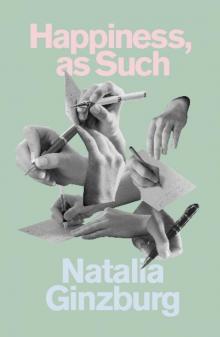 Happiness, as Such
Happiness, as Such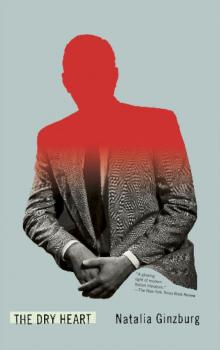 The Dry Heart
The Dry Heart The Manzoni Family
The Manzoni Family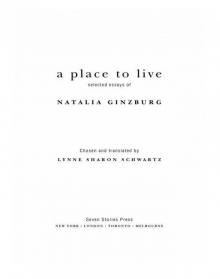 A Place to Live
A Place to Live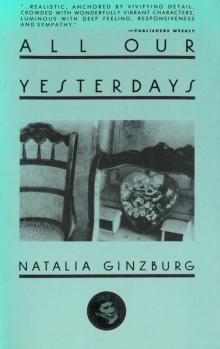 All Our Yesterdays
All Our Yesterdays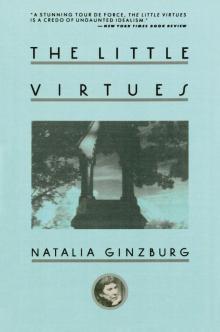 The Little Virtues
The Little Virtues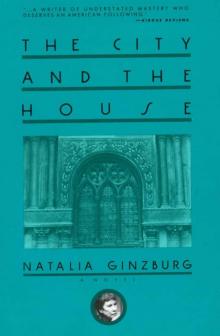 The City and the House
The City and the House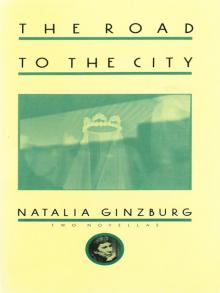 The Road To The City
The Road To The City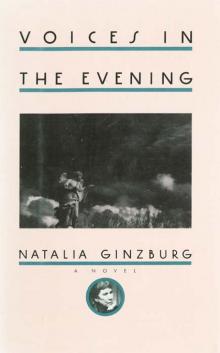 Voices In The Evening
Voices In The Evening